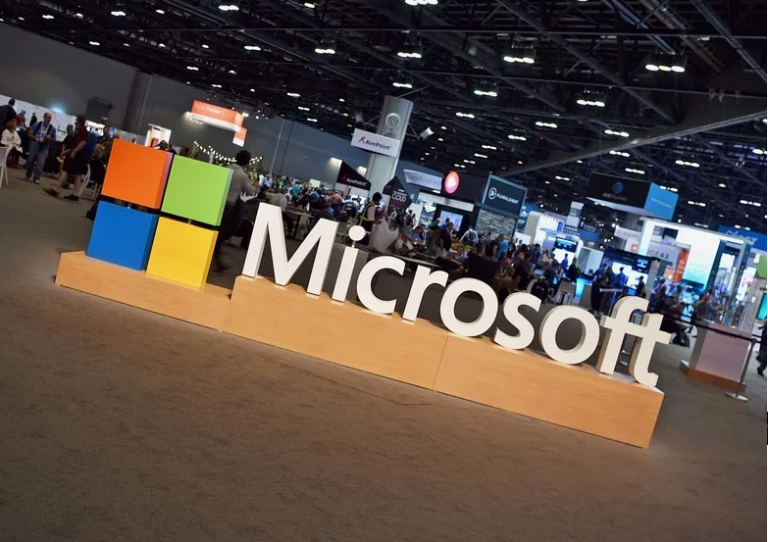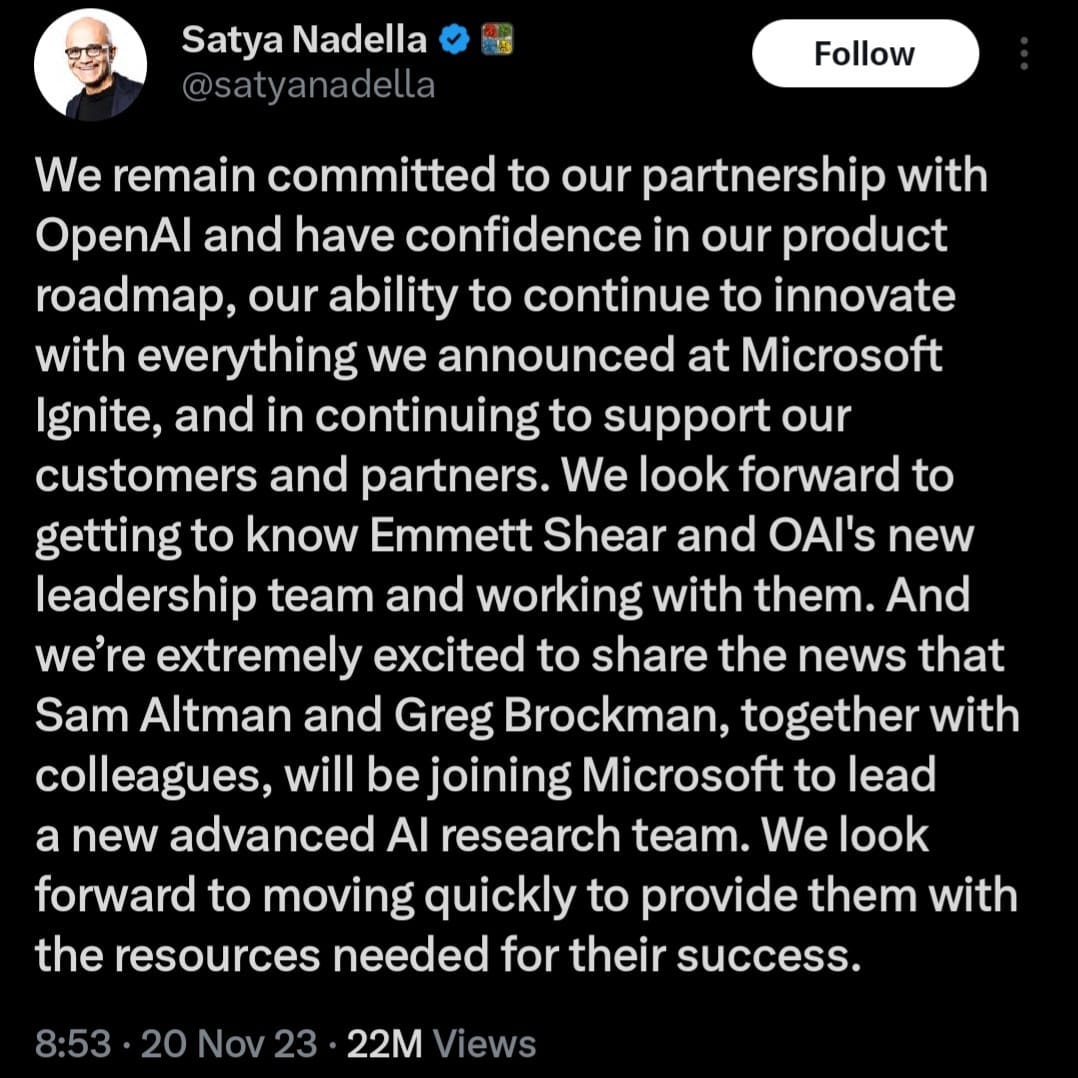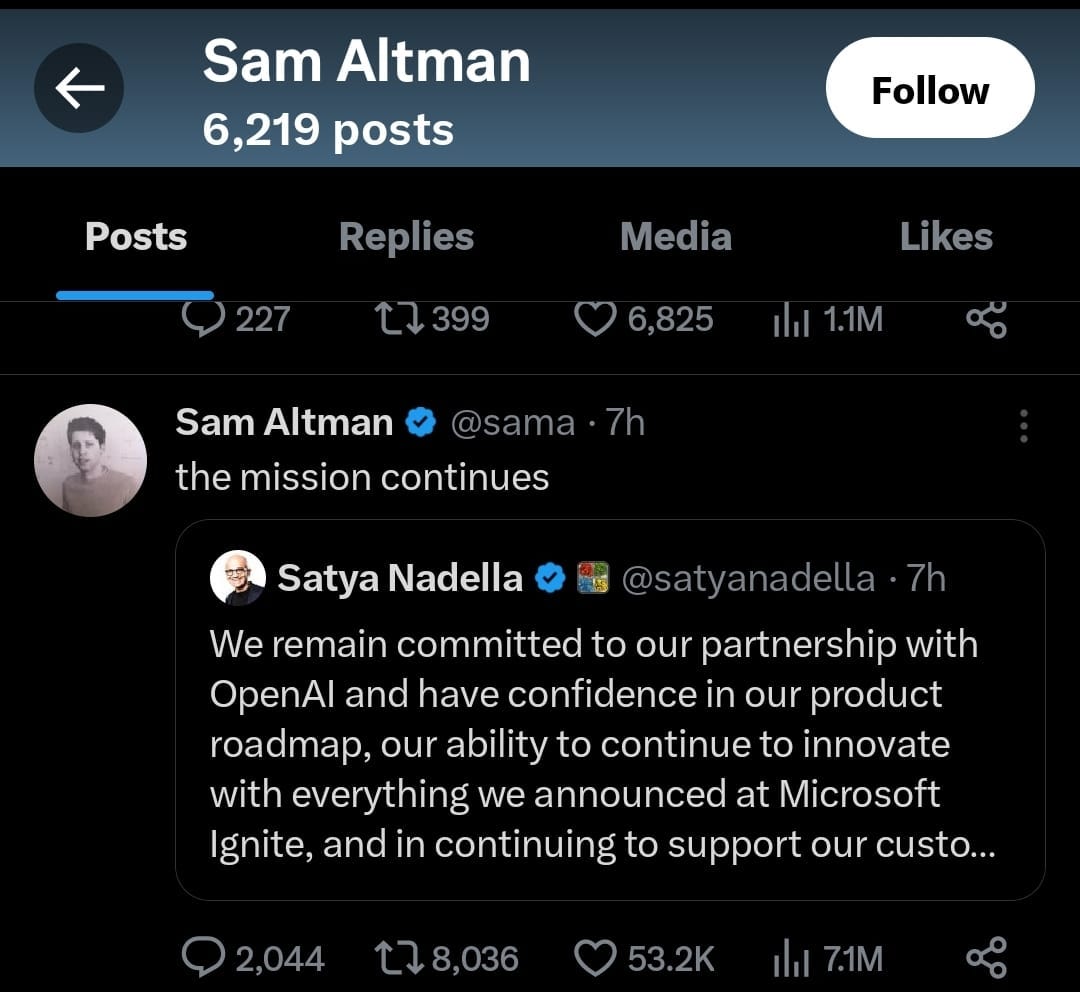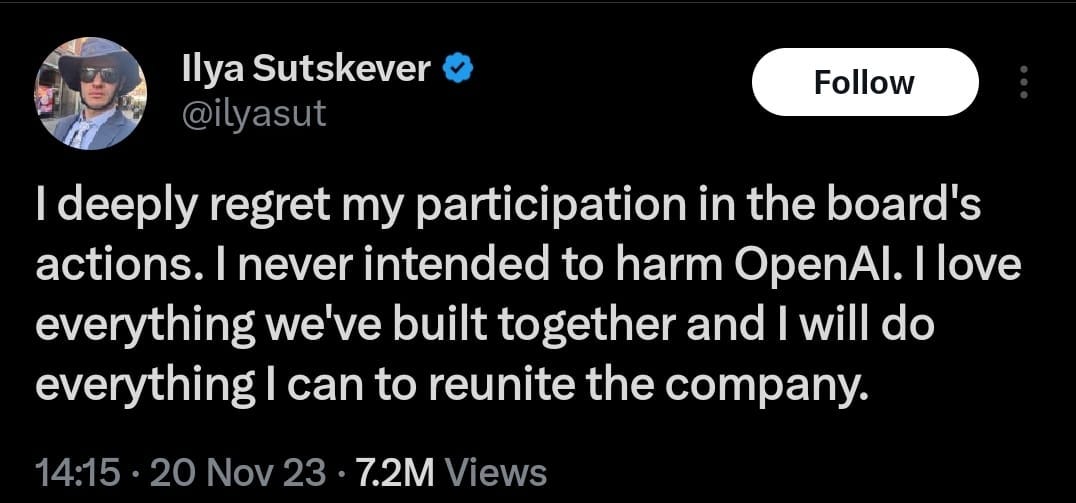
Microsoft announced today that it has hired Sam Altman, the former CEO of OpenAI, as a senior advisor on Artificial intelligence and Innovation. Altman, who stepped down from OpenAI on 18th, November 2023, will join Microsoft along with several other former OpenAI staff members, including Ilya Sutskever, Greg Brockman, and Wojciech Zaremba.

Microsoft said that the new hires will help the company accelerate its AI research and development, as well as foster collaboration with the broader AI community. Microsoft has been a major supporter of OpenAI since 2019, when it invested $1 billion in the research organization and became its exclusive cloud provider. Sam Altman has responded to Microsoft CEO offer on X with few inscriptions “The mission Continues” showing interest in the new offer.

Altman is a prominent figure in the tech industry, having previously led Y Combinator, one of the most influential startup accelerators in Silicon Valley. He was also one of the co-founders of OpenAI, along with Elon Musk and other tech luminaries, in 2019. OpenAI is a non-profit organization dedicated to creating and ensuring the safe and beneficial use of artificial general intelligence (AGI), which is the hypothetical level of AI that can perform any intellectual task that a human can.
Register for Tekedia Mini-MBA edition 19 (Feb 9 – May 2, 2026): big discounts for early bird.
Tekedia AI in Business Masterclass opens registrations.
Join Tekedia Capital Syndicate and co-invest in great global startups.
Register for Tekedia AI Lab: From Technical Design to Deployment (next edition begins Jan 24 2026).
OpenAI board destroying $100B in enterprise value in one weekend, allowing Satya Nadella to acquire their entire team.
In a stunning display of mismanagement and shortsightedness, the board of OpenAI has effectively destroyed $100 billion in enterprise value in one weekend and allowed Satya Nadella, the CEO of Microsoft, to acquihire their entire team.
The chain of events that led to this outcome began on Friday, November 17, when OpenAI announced that it was spinning off a new for-profit company called OpenAI LP, which would be able to attract more funding and talent, while still pursuing the same mission as the original non-profit. The new company would be governed by a “capped return” model, which would limit the returns to investors to 100x their initial investment and direct any excess profits back to the non-profit entity.
However, this announcement raised more questions than answers. How would OpenAI LP ensure that its research and products are aligned with the public interest and not influenced by the profit motive? How would it balance the need for openness and transparency with the need for secrecy and competitiveness? How would it prevent conflicts of interest among its investors, board members, and researchers? And most importantly, how would it maintain its independence and autonomy from Microsoft, which had invested $1 billion in OpenAI earlier that year and had a seat on its board?
The answers to these questions were not reassuring. On Saturday, November 18, OpenAI revealed that Microsoft had acquired an exclusive license to use its most advanced technology, the GPT-3 language model, which can generate coherent and convincing text on almost any topic. This meant that Microsoft would have a monopoly on one of the most powerful AI tools ever created, while other researchers and developers would have to rely on a limited and restricted API access. Moreover, Microsoft would have the ability to censor or manipulate the output of GPT-3 according to its own interests and agenda.
The reaction from the AI community was swift and harsh. Many criticized OpenAI for betraying its own principles of openness and fairness, and for handing over a potentially dangerous technology to a corporation that has a history of antitrust violations and unethical practices. Some even accused OpenAI of being a “Trojan horse” for Microsoft, which had used its investment to gain control over its research and talent.
The final blow came on Sunday, November 19, when OpenAI announced that it was dissolving its non-profit entity and merging with OpenAI LP, effectively becoming a fully owned subsidiary of Microsoft. The board of OpenAI claimed that this was necessary to simplify the legal structure and streamline the operations of the organization. However, many saw this as a blatant capitulation to Microsoft’s demands and a complete abandonment of OpenAI’s original mission and vision.
The consequences of these decisions are likely to be devastating for OpenAI and the AI field at large. By losing its independence and credibility, OpenAI will also lose its ability to attract and retain top talent, who will either leave for other organizations or join Microsoft.
By giving up its most valuable asset, GPT-3, to Microsoft, OpenAI will also lose its competitive edge and innovation potential, while enabling Microsoft to dominate the AI market and shape the future of humanity according to its own interests. And by abandoning its non-profit status and mission, OpenAI will also lose its moral authority and social responsibility, while betraying the trust and support of its donors, partners, and stakeholders.
OpenAI’s board has made a grave mistake that will haunt them for years to come. They have not only destroyed $100 billion in enterprise value in one weekend, but they have also jeopardized the future of AI and humanity.
Altman said that he is excited to join Microsoft and work with its talented AI team. He also praised Microsoft’s vision and commitment to advancing the field of AI for the common good. “Microsoft is one of the few companies that has the resources, the expertise, and the culture to make a positive impact on humanity through AI,” he said. “I look forward to working with them to create breakthroughs that will empower everyone to achieve more.”
Microsoft CEO Satya Nadella welcomed Altman and his colleagues to the company and expressed his admiration for their work at OpenAI. He also said that Microsoft shares their passion and vision for creating responsible and trustworthy AI systems that can benefit society.
“We are thrilled to have Sam Altman and his team join us at Microsoft,” he said. “They are some of the brightest minds in AI, and we are confident that they will help us push the boundaries of what is possible and create new opportunities for our customers and the world.”

I deeply regret my participation in the board’s actions. I never intended to harm OpenAI. I love everything we’ve built together, and I will do everything I can to reunite the company, ILya Sutskever, OpenAI board member wrote on X today.



